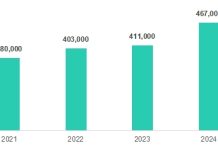Malaysia saw a relative lull in Covid-19 cases earlier in 2020. Thanks to effective lockdown measures and social distancing rules, the country was able to effectively contain the spread of the coronavirus, thus allowing workers to return to the office. Businesses took the opportunity to enhance their business continuity strategy so that they would be ready for another situation like this. Unfortunately, such a disaster has already occurred, and businesses are nowhere near ready to cope.
A resurgence of Covid-19 cases in Malaysia has prompted many businesses to send their workers home once again, as the government has warned against going out unnecessarily in recent weeks. Businesses have been on the ropes for many months now, with further restrictions now a possibility.
Bank Negara Malaysia data revealed that some two million borrowers had been engaged by banks as at end-September, of which roughly half a million were rescheduling and restructuring (R&R) applications. These applications were processed with a 98 percent approval rate.
At the onset of the pandemic, banks and government entities throughout Malaysia began offering initiatives and packages to help support businesses, especially SMEs through the economic devastation that followed. By the end of September, some 840,000 individual and SME borrowers had opted out or already started to resume repayments in line with improved economic conditions, a testament to the effectiveness of Malaysia’s handling of the coronavirus.
However, a recent survey conducted by the Associated Chinese Chambers of Commerce and Industry Malaysia found that while a third of respondents needed help with their loan repayments, only 55.6 percent of them had actually contacted their banks.
It also found that there were a number of SMEs that might have been unaware that seeking assistance or applying for R&R would in fact not get them blacklisted, or otherwise affect their central credit reference information system record.
This suggests that there are businesses out there that might have fallen through the cracks and have made use of the full extent of pandemic-related businesses assistance previously on offer.
According Standard Chartered Malaysia country head of retail banking Lai Pei-Si, Standard Chartered has identified companies involved in the e-commerce, food delivery and medical supply ecosystem as requiring more banking assistance and working capital in order to ensure business continuity.
“Although some clients are struggling with a lack of demand and require relief measures in that regard, others are facing surging demand and require access to additional funding up and over their usual levels. We are working closely with our clients and risk teams, so we are able to provide funding where it is needed the most, and in particular, to support those companies that are directly and indirectly involved in fighting the pandemic,” said Lai.
Industries such as these will tend to require support because of the forced rapid migration to digital technologies, driven by the pandemic, such as institutionalising virtual working practices and implementing digital solutions to facilitate the strengthening of resilience throughout the value chain.
As of now, digital technologies remain a core driving force for economic recovery, and it is those businesses on the frontlines of the fight against Covid-19 – e-commerce players, F&B businesses, as well as delivery services providers – that will need assistance to accelerate their digital transformation in order to keep pace with spiking demand. Lai also mentions that pharmaceutical and medical equipment ecosystems will also need additional assistance as they are making use of cutting-edge technologies to deal with the pandemic.














